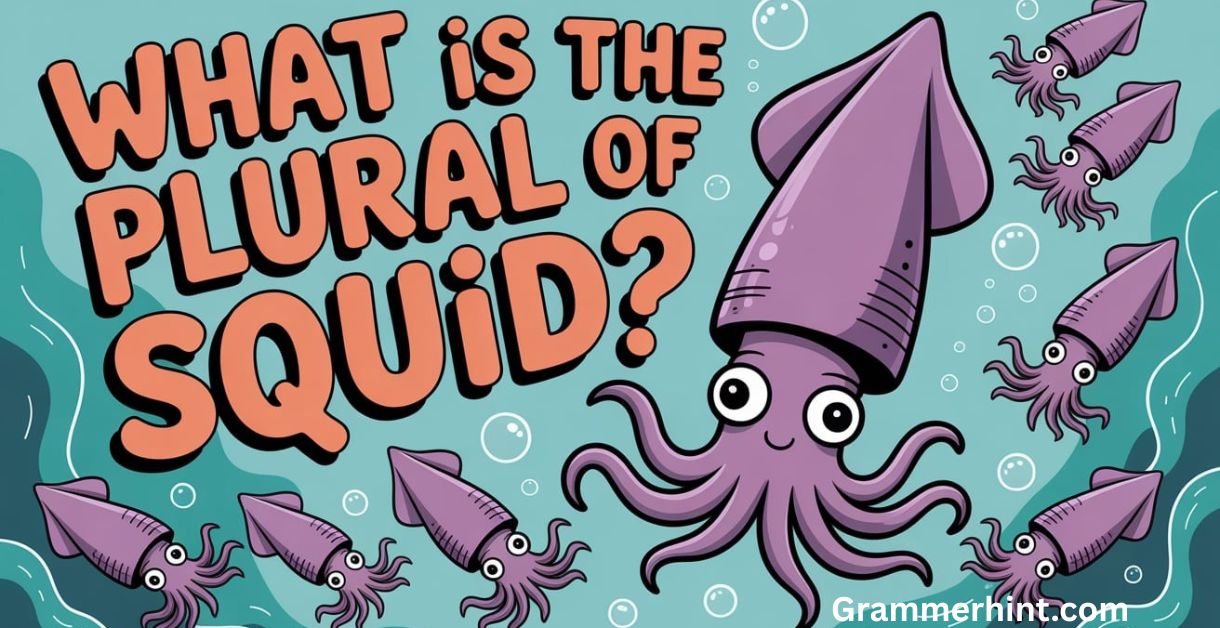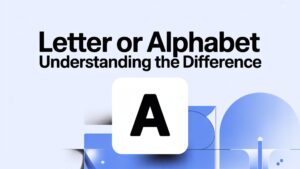Ever stood at a fish market or flipped through a marine biology journal and thought: Wait should I say squid or squids? You’re not alone. The plural of ‘squid’ stirs up more confusion than you’d expect from such a slippery sea creature.
In English, most plural nouns are a breeze. Add an “s” and you’re done cat becomes cats, boat becomes boats. Easy. But then there are words like squid, part of a fascinating group of cephalopods that play by their own grammatical rules.
So, what’s the deal? Is the correct plural for squid just “squid”? Or is “squids” valid, too?
Let’s dive in.
Singular Form: Squid
The word squid refers to a soft-bodied sea creature with tentacles, a sharp beak, and a penchant for ink-based escapes. In the world of marine biology, it’s a big deal—especially to scientists who study ocean species and animal behavior.
It’s a singular noun, just like fish or deer.
Singular to Plural Transition:
In typical English fashion, we often pluralize by tacking an -s to the end of a word. But marine life doesn’t always follow such tidy rules.
Take the word fish. In general, “fish” is both singular and plural. But if you’re talking about different species? Then “fishes” is the way to go.
Squid behaves the same way.
Both squid and squids are accepted in English. But each one carries its own nuance. Let’s break it down.
Plural Forms: Squid or Squids?

Welcome to the waters of linguistic variation.
Differentiating Plural Forms:
“Squid” can serve as the plural when referring to a group as a whole. This usage is more common in scientific, formal, and environmental contexts.
“Squids” steps in when you’re referring to different types or species of squid. It gives a sense of individuality.
So both are grammatically correct—but your contextual grammar usage matters.
Scenario Example 1 – Scientific Report Excerpt:
“Over 300 squid were observed off the coast of Hawaii, exhibiting complex mating rituals and coordinated movement.”
Here, “squid” is used collectively—likely referring to a single species.
Scenario Example 2 – Seafood Exporter Email:
📧 Subject: Fresh Order from Indonesian Waters
Hi Miranda,
Just a heads-up—we’ve received a batch of squids from three distinct regions: Banda, Sumbawa, and Flores. Each variety differs slightly in texture and taste. Let me know if your chefs need a sample box.
Best,
Hector
In this case, squids refers to different varieties. That distinction matters, especially in trade and cuisine.
Contextual meaning of word usage is everything here. The more specific the reference, the more likely “squids” fits.
Animal Behavior and Individuality
To really understand why both “squid” and “squids” work, you have to look beyond the dictionary and into the deep blue sea. The difference isn’t just grammatical—it’s behavioral.
In the natural world language, we often use collective nouns to describe animals that move or behave as a group. Think of a school of fish, a herd of deer, or a flock of birds. Similarly, squid, when behaving collectively in the Ocean, is often treated as a mass noun—no “s” needed.
But what if you’re highlighting the individuality of multiple species, behaviors, or physical traits? That’s where “squids” becomes not only acceptable but more accurate.
Let’s look at some real-life uses.
Scenario Example – Nature Documentary Script:
🎙️ “Off the coast of California, thousands of squid form dense schools, pulsing through the water in perfect synchronization. But in the Pacific trench, three rare squids have been spotted exhibiting solitary hunting patterns each unique in behavior and design.”
This excerpt shows both forms used side by side. The narrator uses squid to describe a unified group and squids when spotlighting individual species with distinct traits.
This aligns with the schooling vs. individual behavior principle. Group action calls for the collective “squid.” Specific differences? That’s when squids surfaces.
English Grammar Rules (Regular vs. Irregular Plural Forms)
Let’s zoom out for a moment and look at how English plural rules apply more broadly.
Most English words follow a regular plural pattern: dog → dogs, tree → trees. But some words, especially those relating to animals or foreign origins, veer into the world of irregular plurals.
Consider these:
- Deer → deer (not deers, usually)
- Fish → fish or fishes
- Moose → moose (never mooses)
Squid plural usage falls into this fuzzy category, straddling both regular and irregular patterns. It’s a great example of how grammar usage adapts based on field, formality, and even cultural tone.
In scientific writing, “squid” is often used because it reads smoothly, mimicking “fish.” But in less formal speech or writing, “squids” is gaining traction—especially when marine life diversity is the focus.
Collective vs. Individual Reference
This is where things really get interesting for word nerds and marine lovers alike.
If you’re referencing a group of squid acting as one unit, “squid” is the better fit:
- “A pod of squid migrated south for spawning season.”
If you’re pointing to several distinct individuals or species, “squids” works better:
- “The tank contains three squids: Humboldt, Caribbean reef, and Giant Australian.”
This mirrors how we talk about hair. We usually say, “Your hair looks great,” referring to it as a mass noun. But if you find strands in your soup? “There are three hairs in my bowl!”
Same logic. It’s about specificity.
Scenario Example – Marine Biology Lecture Slide:
📊 Slide Title: Cephalopod Diversity in Indo-Pacific Waters
- Over 200 species of squid identified globally
- Study focused on 5 unique squids: each from separate ecological niches
- Comparative analysis of camouflage behavior, inking frequency, and speed*
This kind of distinction supports both biological classification and clear communication.
Linguistic Flexibility and Regional Usage
Here’s where linguistic variation really kicks in.
In American English, both forms are commonly accepted. British English tends to favor “squid” more consistently in plural use. But even there, you’ll find squids appearing in writing that focuses on species distinction or dramatic effect.
In culinary circles, “squids” may pop up when menus or recipes want to highlight different types:
- “Our grilled Mediterranean squids are stuffed with lemon and herbs.”
In contrast, a scientific journal might read:
- “Squid in the region showed heightened neural activity during light exposure.”
A Note on Marine Life and Scientific Naming
Scientists who specialize in marine biology often lean toward using “squid” as the standard plural. That’s because they’re usually discussing the animal as a species—not showcasing multiple varieties in a single sentence.
And in taxonomic writing, where cephalopods like squid are formally named and classified, clarity matters.
Fun fact: Squid belong to the order Teuthida, which includes around 300 species.
In academic or field research, clarity is key. So while “squids” isn’t wrong, “squid” tends to be cleaner and more uniform.
Scenario Example – Academic Email from Scientist to Graduate Student:
📧 Subject: Draft Feedback – Cephalopod Study
Hi Nicole,
Good work on the behavioral section. A quick note—use “squid” instead of “squids” when referring to general behavior across the order. Unless you’re pointing out species-specific patterns, “squid” is more conventional in marine biology.
Let me know when your next draft is ready.
Best,
Dr. Hathaway
This is a great example of contextual grammar usage guided by field-specific norms.
Everyday English vs. Scientific Accuracy
In everyday English vocabulary, people tend to say “squids” just because it feels normal to pluralize. And that’s fine—especially when clarity is key.
Let’s be real: if someone says, “I saw a bunch of squids at the aquarium,” you know exactly what they mean. Language is about communication, not nitpicking.
But if you’re writing for an academic paper, a wildlife report, or an educational resource, you’ll want to think twice about which form you choose.
Squid = general, group, species
Squids = specific, individual, comparative
Scenario Example – Travel Blogger Writing About a Dive Trip:
✍️ “I drifted through a coral canyon and was suddenly surrounded by dozens of squid, gliding like ghosts in the blue. Later, my guide pointed out two smaller squids, each with glowing red spots and twitchy fins I’d never seen anything like them.”
The shift in word forms follows what the writer is experiencing: a group, then individual, distinguishable sea creatures.
Conclusion:
So, what is the correct plural of ‘squid’?
The answer isn’t black and white—it’s beautifully contextual. In fact, the distinction between squid and squids tells us something fascinating about both language and the natural world.
Use squid:
- When referring to a group of these sea creatures as a whole
- In scientific, academic, or environmental contexts
- When the type or species isn’t specified
Use squids:
- When you’re pointing out individual species or multiple types
- In informal settings where clarity is needed
- When highlighting distinct characteristics or behaviors
Understanding the pluralization of animals like squid (animal/sea creature) isn’t just a grammar geek’s game it’s part of navigating English vocabulary in ways that respect the precision of both language and nature.









